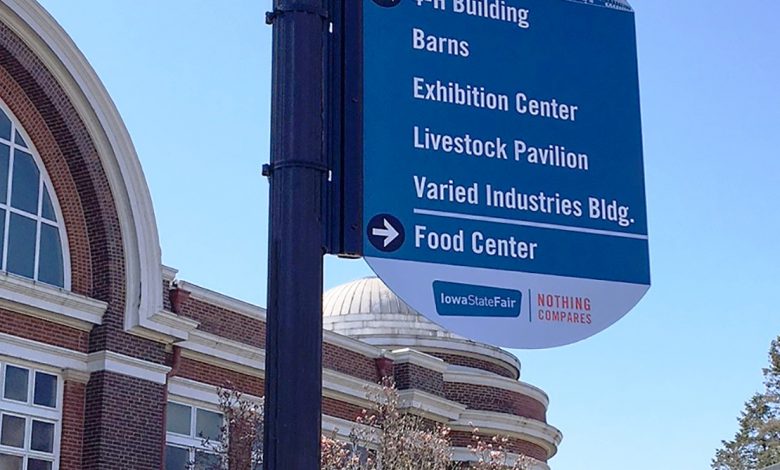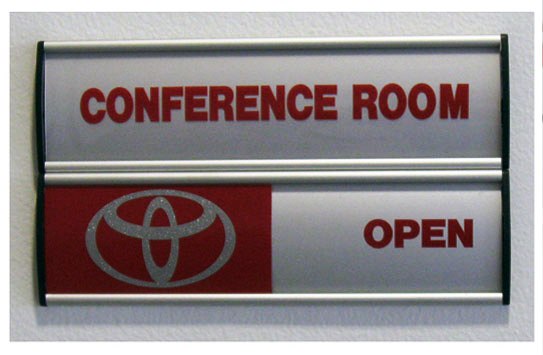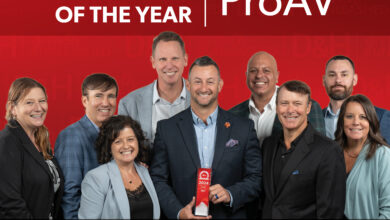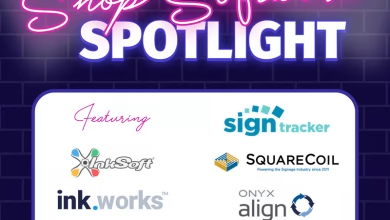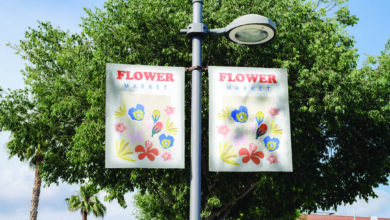Small sign shops facing a big sales opportunity and knowing they can’t complete the job alone have a couple of choices: Partner with a fellow sign shop in their region or work with a wholesale manufacturer. But how do they make the decision?
When it comes to fulfilling a wayfinding project, opting for a wholesaler offers numerous benefits to a sign company.
“The number one benefit is the focus on service and providing the greatest amount of options and support relative to the sale,” says Charles Kelly, Jr., president and owner of Clarke Systems in Allentown, Pennsylvania, a wholesale provider of interchangeable wayfinding systems for more than 35 years. “We’re excited to work with the sign shop that has an opportunity-in most cases, we will have greater capacity, design support and sampling, project documentation, and installation preparation over an independent. To sum it up, we’re ready to react to our dealer’s opportunity with a turn-key solution from design to installation. We’ll even join them in the field if the job warrants.”
Wholesalers of wayfinding systems sell to sign companies or brokers needing to fulfill small and large orders for their customers, Kelly says. Wholesalers focus on the products needed to fulfill a wayfinding project, while independent sign shops split their focus between their retail sales business and their wholesale products, he says.
“I believe it is safe to say that any company that specializes in a service or product will more likely be ready to assist whatever the request,” Kelly says. “The specialist will be able to adapt to time challenges, provide greater insight due to their experience, create numerous solutions as situations dictate, and possess the equipment and inventories to react in the sign shop’s best interest.”
A Level of Focus and Speed
Wholesalers also provide a level of focus and speed in getting information, such as quotes, product samples or specifications, to the customer, Kelly says. They have deep knowledge about product features and situations that often come up in project programming and can support the placement and logistics of product installation, he says.
“Ideally, seeking the expertise of a company that specializes in wayfinding signage is recommended,” says Jeffrey Stewart, vice president of sales for Howard Industries, a sign manufacturing company in Fairview, Pennsylvania. “For exterior wayfinding applications, it is crucial to use a company that understands how to analyze both vehicular and pedestrian traffic flow. For interior applications, it is imperative to utilize a company that has extensive knowledge of the ADA compliant signage standards, in addition to possessing a firm grasp on the intricacies of building visitor navigation.”
Wholesalers can and will provide promotional materials, such as literature and samples, to resellers to help them sell the products to their customers, Kelly says. The materials serve as a point of reference to guide the sale and the design and also to provide answers to typical questions, he says. Sign companies focused on retail sales might not have materials readily available for that level of support.
A Level of Expertise
SignPro Systems, a division of Orbus Exhibit & Display Group, in Woodridge, Illinois, sells wayfinding signage systems to sign shops and advertising agencies that are specifying and selling to the end user. Orbus supplies and manufactures a solution based on what the dealer specs out as the clients’ needs and works with the dealer partner to learn the application for use and necessary logistics for the sign systems, says Natalie Whited, vice-president of marketing at Orbus.
The company provides a level of expertise in the manufacturing of the system, working with a team of engineers knowledgeable about product development and a sales team focused solely on marketing the solutions, Whited says. The company also has a full graphics service that can be provided to sign shops that do not have the capabilities to produce their own images.
“Part of it is it helps maintain a level of expertise within the realm of sign solutions,” Whited says. “Not every sign shop can afford an engineer and production staff. … We have expertise in engineering, manufacturing, sales and marketing. Those, to me, are the biggest benefits we promote to our dealer network as far as why they should work with us for their sign solutions. It’s all about service.”
Orbus’s sales team serves as an expert in wayfinding, able to guide and teach customers how to prospect and propose projects to their own customers, Whited says. Team members are able to provide technical documents and marketing materials to help with the sales, as well as offer education and training about the product lines it offers, she says.
“They become an extension of the dealer’s team to make sure the right solution is being pitched to sell to the needs of the end customer,” Whited says. “We have people who go out in the field and visit dealers face-to-face about how the sign solutions work. … Those salespeople do more than take an order … they really help provide guidance to the right solution for the needs of the end customer.”
Customer Incentives
As wholesalers, wayfinding signage companies also can offer a selection of products that are priced at good, better and best levels that meet their needs as well as their budget, Kelly says.
“We are focused and determined to find the best product at the best price for each opportunity,” Kelly says.
Like Clarke Systems, Orbus can offer a lower price point that makes the product more affordable for its customers, Whited says.
“We have a variety of different price programs for our distributor customers,” Whited says.
Orbus provides customer incentives through a variety of rebates and discounts. The company offers different quarterly discounts and promotions on certain product lines, but not usually on custom orders, Whited says.
Discounts at Clarke Systems are relative to the quantity and size of an order that result in cost savings for the customer, Kelly says. Additional discounts can be offered based on financial terms that establish the timing of payments, he says.
The Ordering Process
The process for ordering and receiving differs for a wholesaler than a sign shop. Typically with a wholesaler, an order begins with a site survey and a decision on the quantity, placement and message content for the sign or signage system, Stewart says.
“This information is then applied to the desired signage design, and once approved by the customer, manufacturing begins,” Stewart says. “The duration of the manufacturing and installation process will vary from company to company depending on their lead time policies.”
Orbus, for instance, will take an order for a sign shop or dealer and blind ship it to the end user, unaware that Orbus is the manufacturer or a partner in the wayfinding solution. Orbus also will ship the order directly to the sign shop.
The orders are taken through a sales representative, who provides information and answers customers’ questions, Whited says. Once the order is taken, the sign systems are manufactured and shipped based on the desired timeframe for delivery, though large orders will take longer, she says. The orders will consist of the sign, of course, along with the mounting hardware, graphic elements and support documentation relative to the installation.
“In the case of a large program, there will be ongoing communications that will allow for greater understanding of the project deliverables,” Kelly says. “Moving from design to ordering is seamless. As for receiving the product, great care is taken to organize the order in a fashion to facilitate installation.”
The standard production time for most orders is two weeks, but on larger jobs, the delivery often will need to be phased according to the project schedule, Kelly says.
“That is, a timeline with multiple goals can be created with the sign shop that supports the project’s flow,” Kelly says. “This includes consideration of other projects trade groups-for example, paint, wallpaper, flooring and ceiling-and their efforts within the same space.”
The orders often will carry a warranty-several sign solutions manufactured in the United States will offer longer warranties, an advantage of working with a wholesaler, Whited says.
“Orbus offers a lifetime warranty on its wayfinding systems,” Whited says.
Warranties vary from company to company, but generally will be for one to five years on signage products, Stewart says.
“Some projects-government programs for one-may require longer periods. If so, the request can be considered and modified if acceptable to all parties,” Kelly says.
When asked what advantages Kelly sees in a sign shop working with a local independent sign shop versus a wholesaler, he pointed out the possibility of existing relationships and a home town advantage.
“If someone feels more comfortable visiting with someone in the same town, then we can’t compete with that,” Kelly says. “Existing relationships and proximity are two conditions that may direct a shop one way versus the other. Human nature’s need for comfort and confidence will ultimately lead to a decision. But it is fact that a specialist will enhance the probability of a successful outcome.”
If the project warrants, Clarke Systems will join the customer to secure and develop the opportunity, Kelly says. But for customers that do not need a visit, they can send a drawing of what they desire in size and color or select from Clarke Systems’ online catalog, which includes product images and descriptions, he says. Most orders, depending on quantity and scope, can be sent out in one to two weeks, he says.
“With a wholesaler, it leads back to the engineering and expertise that is required surrounding the fact that we designed the system and there is team in place that manufacturers and produces it every day,” Whited says. “They become experts in it. … The expertise and capability is certainly the benefit.”
Wholesalers have their sole focus on the customer and “dedicate their efforts to fulfilling orders for an intermediate partner, the sign shop,” Kelly says.
“Our success and longevity as a wholesale provider is based on the help that we provide to shops every day, whether it is a large order or small,” Kelly says. “Therefore, the probability of the wholesaler being able to deliver the needed support on a large project, when your shop can’t, is much more likely than buying from an independent sign company.”

